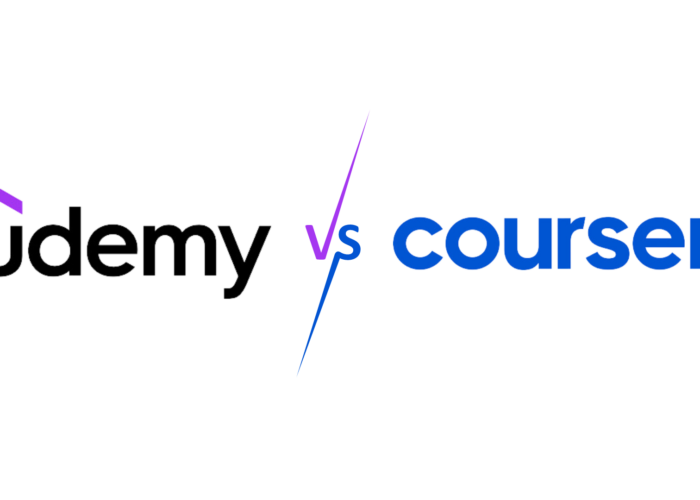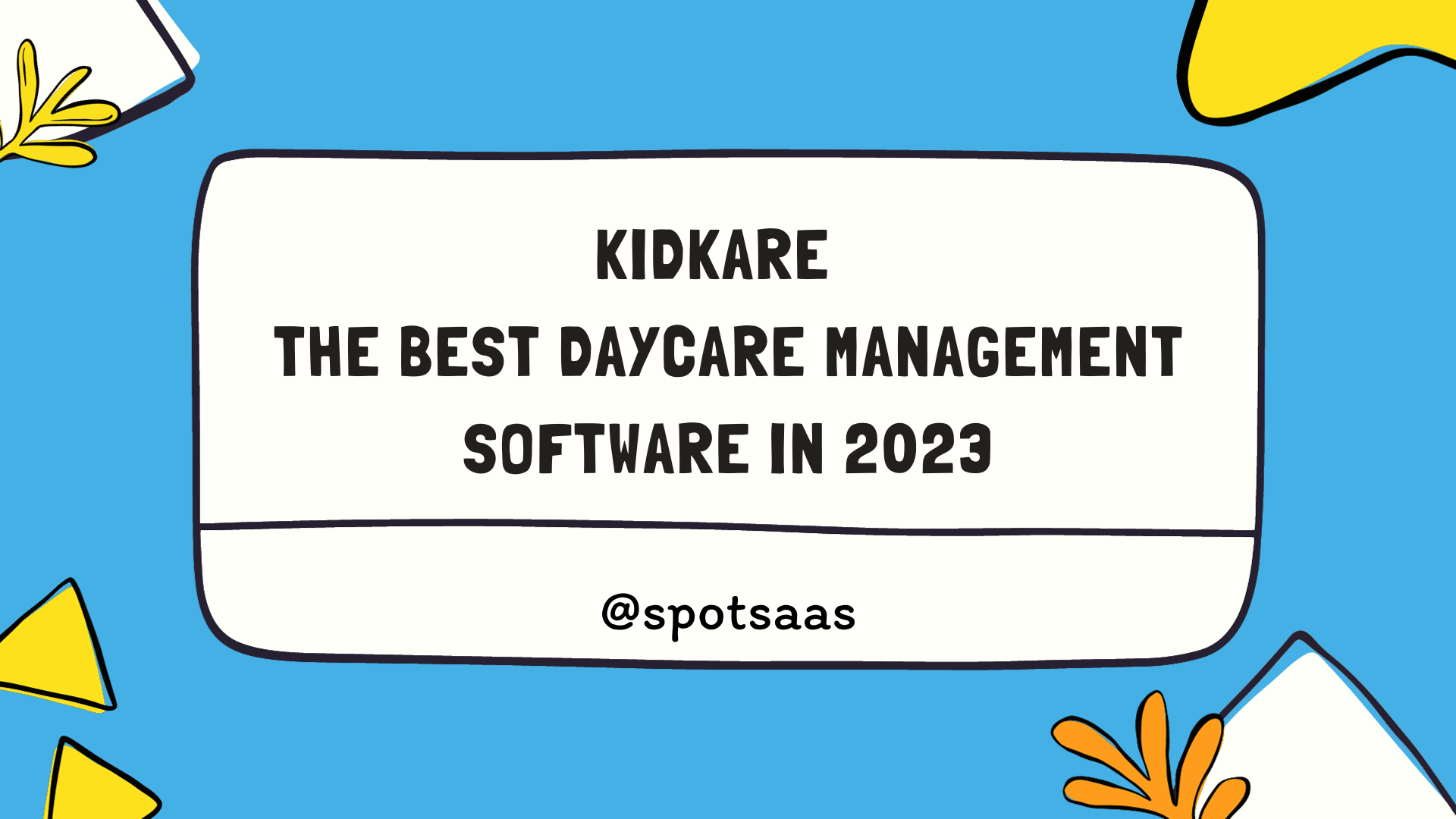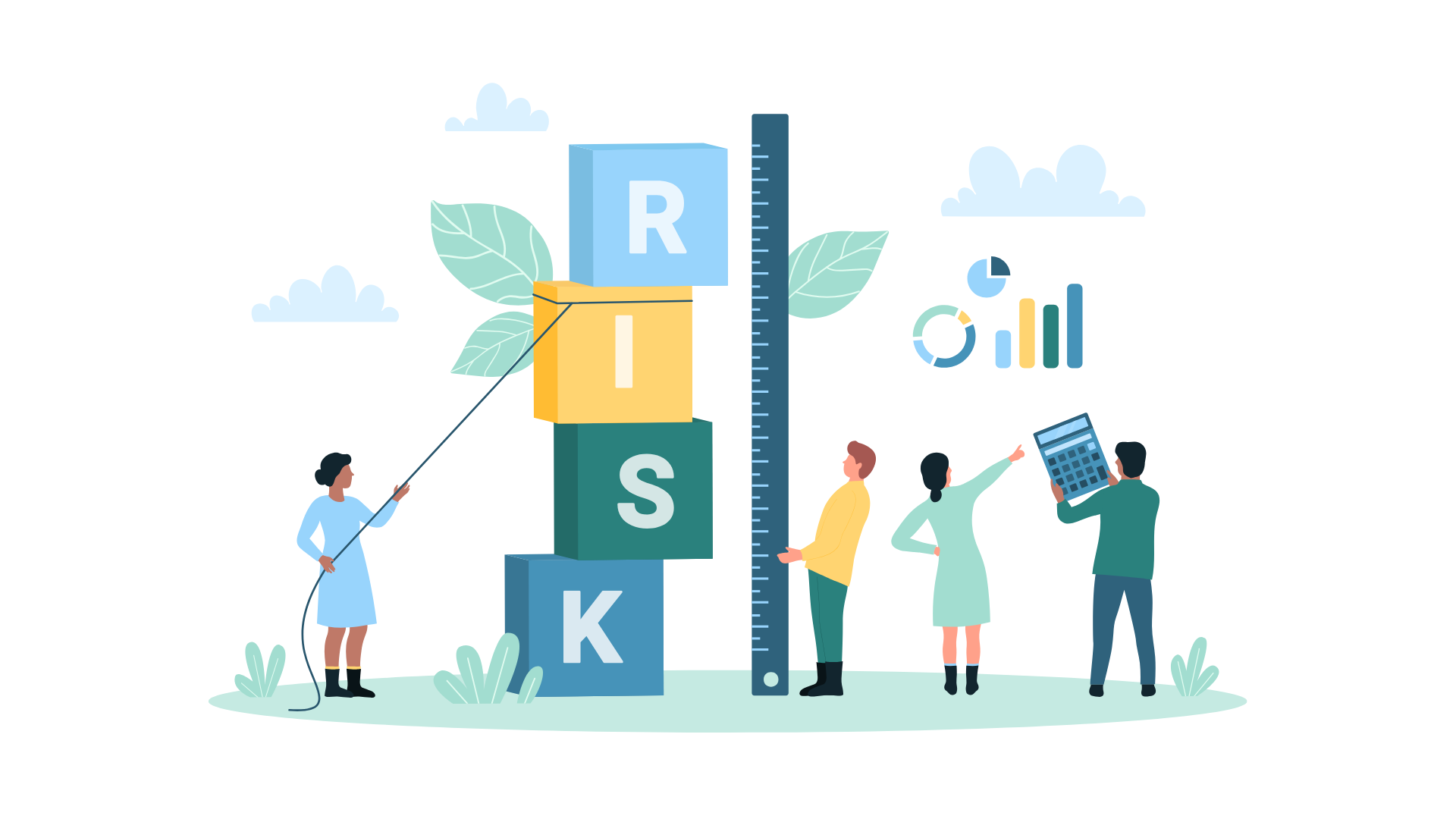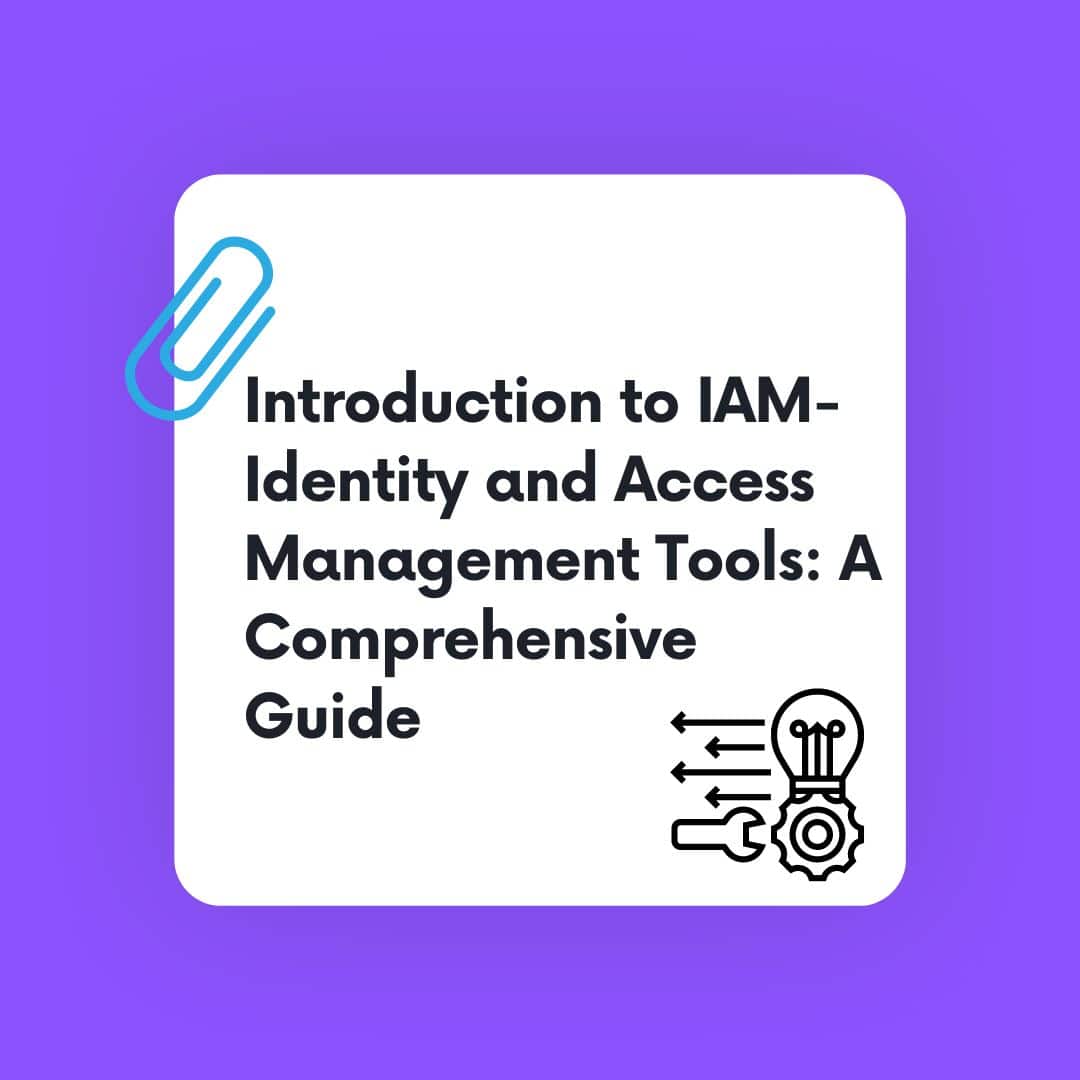Deciding between online learning platforms can be tricky, with so many options available. One fact to note is that both Udemy and Coursera offer a wide range of free and paid courses, but each has its unique strengths.
This article will guide you through the differences between these two giants to help find your ideal fit for learning new skills or advancing your career. Dive in to make an informed choice on where to invest your time and money for education online!
Key Takeaways
- Udemy has over 155,000 courses ranging from development to personal hobbies and provides a Certificate of Completion for all courses.
- Coursera offers accredited certificates and degrees through partnerships with top universities, focusing on in-depth learning and professional advancement.
- The choice between both platforms depends on your learning needs: Udemy may be better for acquiring specific skills quickly or exploring interests without seeking accreditation. In contrast, Coursera is ideal if you want formal recognition from established universities or a more academic approach to online education.
- Both platforms allow potential students to preview courses before purchasing, but only Coursera’s courses might earn college credits due to their accredited nature.
- You can evaluate the quality of a course by looking at instructor qualifications and scrutinizing user reviews and ratings; higher-quality instruction is typically found on Coursera due to its collaboration with recognized institutions.
Udemy vs Coursera: A In-dept Comparision
Coursera and Udemy stand out as popular platforms offering diverse learning opportunities. Coursera, with its partnerships with renowned universities, provides accredited programs, professional certificates, specializations, and online degrees, ensuring a structured and high-quality learning experience. Udemy, on the other hand, excels as a skill development hub with over 155,000 courses across various categories, offering flexibility and a wide range of subjects to boost your career and personal growth.
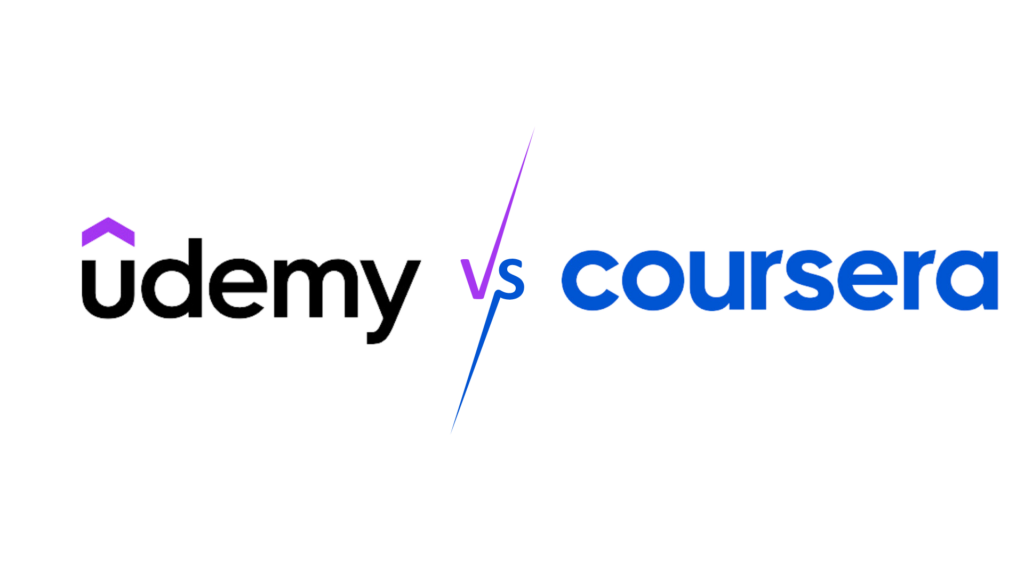
Types of Courses Offered
Udemy offers over 155,000 courses in various categories like development, business, design, marketing, etc. Udemy shines as a hub for skill development, housing an extensive library of educational programs designed to boost your career and personal growth. Whether you’re looking to master web development, and graphic design, or dive into the realms of photography and personal finance, Udemy has you covered.
Coursera offers a wide range of accredited programs, including course certificates, professional certificates, specializations, and fully accredited online degrees. These recognized certifications provide individuals with the opportunity to gain professional credentials and specialized training from top academic institutions.
Coursera has established partnerships with renowned universities such as Duke and Imperial College to ensure that the accreditation process meets industry standards, offering learners higher education opportunities for career advancement.
These learning opportunities are structured for those seeking in-depth understanding and potentially lead you toward accredited certificates or degrees that can open new professional avenues.
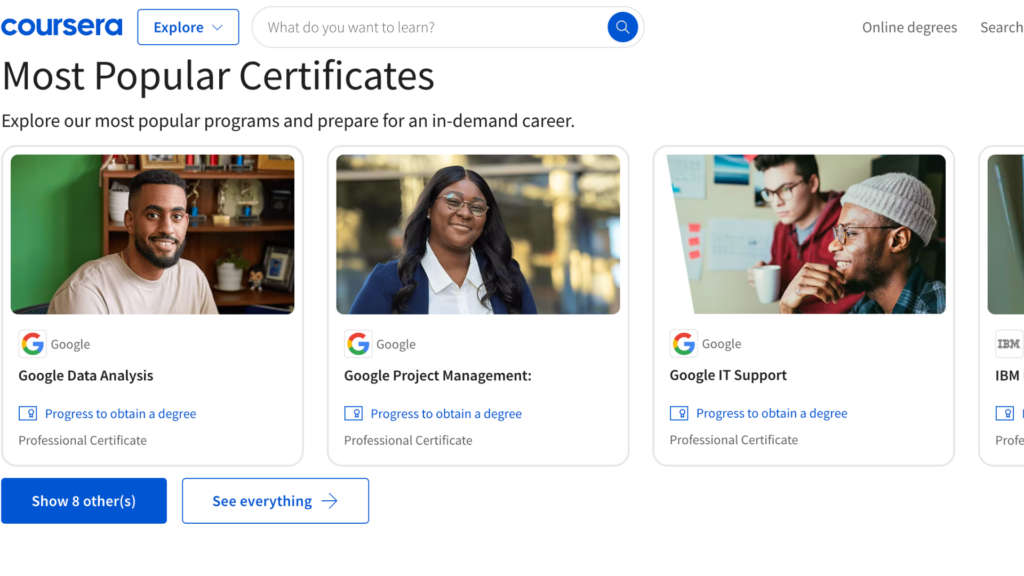
Quality of Courses and Instructors
As we explore the variety of courses offered, it’s crucial to consider the caliber of educational content and who is delivering it. On Coursera, every course reflects a collaboration with esteemed academic institutions and passes through a thorough beta testing process to ensure optimal quality assurance.
This means learners engage with expert-led courses crafted by professors renowned in their fields, guaranteeing a learning experience that’s both credible and instructional.
Diving into the profiles of instructors on these platforms reveals a stark difference in teaching quality. Coursera boasts an array of educators hailing from top universities worldwide, which speaks volumes about its commitment to providing high-quality instruction.
In contrast, Udemy operates on an open marketplace model where anyone can create and sell courses—resulting in varying levels of instructor expertise. As prospective students navigate this online learning landscape, they must weigh their options for gaining knowledge that’s not only comprehensive but also presented by qualified professionals.
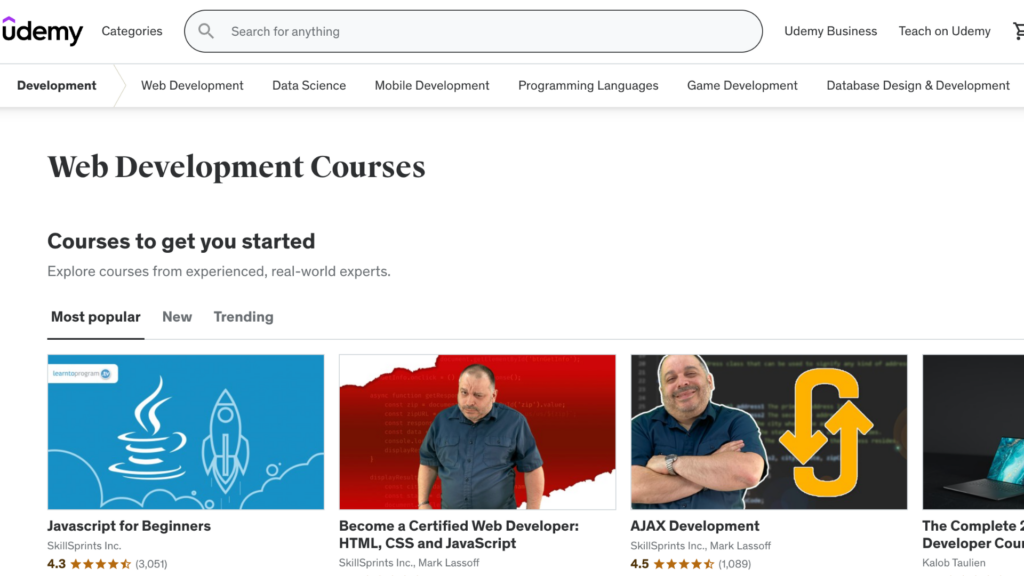
Pricing Models
Both platforms offer a variety of plans designed for individuals, small teams, and larger organizations.
Udemy Pricing & Plans
Udemy provides a variety of pricing plans:
The Personal Plan, ideal for individual learners, offers access to over 11,000 top courses. This plan includes certification preparation, goal-focused recommendations, and AI-powered coding exercises.
For small teams of 5 to 20 people, the Team Plan is available at $360 per user per year, billed annually. It includes the same extensive course access, certification prep, goal-focused recommendations, AI-powered coding exercises, and additional features like analytics and adoption reports.
For larger organizations with more than 20 employees, the Enterprise Plan offers a learning solution with access to over 25,000 courses, advanced analytics, and insights, a dedicated customer success team, an international course collection in 15 languages, customizable content, and optional add-ons for hands-on tech training and strategic implementation services.
Coursera Pricing & Plans
Coursera offers a range of pricing plans tailored to individual learners and teams, providing flexibility and value for those seeking to obtain qualifications and enhance their skills.
Individual learners can choose from the basic subscription, which ranges from $49 to $79 per month, granting access to specific courses or specializations and a certificate upon completion. For a broader learning experience, the Coursera Plus monthly plan is available at $59 per month, offering access to over 7,000 courses and specializations, unlimited certificates, and over 1,000 hands-on projects and labs. Those committed to long-term learning can opt for the Coursera Plus annual plan at $399 per year, providing the same benefits as the monthly plan with added savings and the flexibility to learn at their own pace.
For teams, Coursera for Teams is available at $399/user/year for 5 to 125 users, offering unlimited access to 8,500 learning opportunities, program configuration tools, and an analytics dashboard to track progress and performance. If you’re looking for business pricing, contact them.
Certificates
After exploring the pricing and payment models of Udemy and Coursera, let’s delve into the valuable aspect of course completion certification. Udemy provides a Certificate of Completion upon successfully finishing a course.
This certificate recognizes your educational achievement and serves as proof that you have completed an online learning program. It can be a compelling addition to your resume, showcasing your commitment to skill development through e-learning certification.
Coursera, on the other hand, offers accredited certifications including course certificates, professional certificates, specializations, and fully accredited online degrees. These verified certificates hold weight with potential employers and signify a deeper level of achievement in comparison to Udemy’s completion certificates.
User Experience
Udemy and Coursera offer distinct user experiences. Udemy’s flexible model allows learners to access courses at their own pace, while Coursera provides a structured approach with weekly assignments and peer assessments.
For quick upskilling needs or acquiring specific skills, Udemy may be suitable; however, those seeking accredited certificates from renowned universities might find greater value in the offerings of Coursera.
Frequently Asked Questions
Curious about how Coursera and Udemy stack up against each other? Explore common questions such as course previews, earning college credits, career switching, time commitment, and evaluating course quality.
Ready to dive in for more detailed answers?
Can you preview a course before purchasing?
You can preview courses on both Udemy and Coursera before making a decision. Udemy allows users to sample the first few lectures of a course for free, giving a taste of what to expect.
Additionally, Coursera offers a 7-day free trial for subscription-based courses, allowing access to the entire content during this period.
Sampling courses before purchasing provides an opportunity to assess the instructor’s teaching style, course materials, and overall suitability for your learning needs. This feature ensures that you can make an informed decision about which course is the best fit for you without any financial commitment upfront.
Can you earn college credits?
Coursera offers accredited programs in fields such as data science, business management, and computer science. These programs provide an opportunity to earn college credits through partnerships with established institutions.
On the other hand, Udemy courses do not offer accreditation or college credit opportunities. Therefore, if you are looking to earn college credits, Coursera would be the ideal choice for accredited academic programs.
Seeking higher education through online platforms has become a viable option for many individuals seeking flexibility in their learning journey. In this context, understanding the potential for earning college credits becomes crucial when choosing an online learning platform.
Can you switch careers using Coursera vs Udemy?
Looking to make a career change? Both Coursera and Udemy offer opportunities for skill development and career advancement. Coursera provides fully accredited online degrees and professional certificates, making it ideal for those seeking accredited institution certificates or considering continuing education opportunities to switch careers.
On the other hand, Udemy’s personalized course recommendations based on current jobs can help you acquire new skills tailored to your desired career path. Additionally, with budget-friendly courses, Udemy is a practical option for those looking to switch careers without breaking the bank.
Embark on your journey toward a new career with confidence by taking advantage of the various professional development and skill-building opportunities available on both platforms.
How much time is needed for courses?
Coursera courses typically require a time commitment of 4-10 hours per week, allowing learners to balance their studies with other commitments. On the other hand, Udemy offers flexible study options as its courses can vary in length from a few hours to several weeks.
With lifetime access and the freedom to learn at their own pace, students have the flexibility to complete Udemy courses according to their schedules.
The time commitment for online courses varies based on individual preferences and needs. Coursera’s weekly study hours range provide flexibility while Udemy’s self-paced learning allows for varying duration of completion.
How can you judge the quality of a course?
Evaluating the quality of a course is essential for making informed learning choices. One way to judge the credibility of a course is by examining the credentials and expertise of the instructors.
Additionally, considering user reviews and ratings can provide insights into the effectiveness and reliability of a course. It’s also crucial to verify if a course offers recognized certificates or qualifications that align with your educational or career goals.
Ensuring that the content aligns with industry standards and best practices is vital in gauging the value of a course. Scrutinizing whether a particular course is backed by accredited institutions or universities can further validate its legitimacy.
Alternatives to Coursera vs Udemy
Looking for alternatives to Udemy and Coursera? Codecademy, edX, and Udacity are top contenders in the online learning sphere. These platforms offer a wide array of courses including coding, software development, technology, and business skills.
Whether you’re seeking to enhance your tech prowess or delve into the world of eLearning, these educational websites provide an excellent avenue for skill-building resources.
Embrace new opportunities with digital education providers like Codecademy, edX, and Udacity as they offer training programs that cater to different learning styles and goals. Take advantage of internet-based learning options that open doors to virtual classrooms and knowledge development tools from the comfort of your own space.
Conclusion: Which Online Learning Platform is Better for You?
Considering your learning goals and preferences, the choice between Udemy and Coursera ultimately depends on factors such as course availability, instructor quality, and your preferred learning style.
While Udemy offers a vast array of courses across different categories with flexible learning options and a pay-per-course model, Coursera provides structured academic programs designed and taught by professors from renowned institutions worldwide.
If you seek accredited certifications, professional development from top universities, or a structured curriculum with peer assessments, Coursera may be the better fit for you. On the other hand, if flexibility in content selection and one-time course purchases is crucial to your learning journey, Udemy could be the suitable platform.
(Image Credit: spotSaaS/Coursera/Udemy)
Frequently Asked Questions
What is the difference between Coursera and Udemy?
Coursera generally offers courses from universities and colleges, while Udemy provides a platform for individuals to create and sell their own courses.
Can I get a degree from Coursera or Udemy?
Coursera offers accredited online degrees from various institutions, whereas Udemy focuses on individual courses, not full degrees.
Are there any free options available on Coursera or Udemy?
Coursera provides some free courses with limited access to certain features, while Udemy often charges for its course offerings.
Which platform has more specialized technical courses?
Udemy hosts numerous technical and specialized skill-based courses created by industry professionals, whereas Coursera emphasizes academic and university-certified programs.
Do Coursera or Udemy offer certifications upon course completion?
Both platforms offer certificates of completion after finishing a course; however, Coursera also provides accredited university certificates for certain programs.


